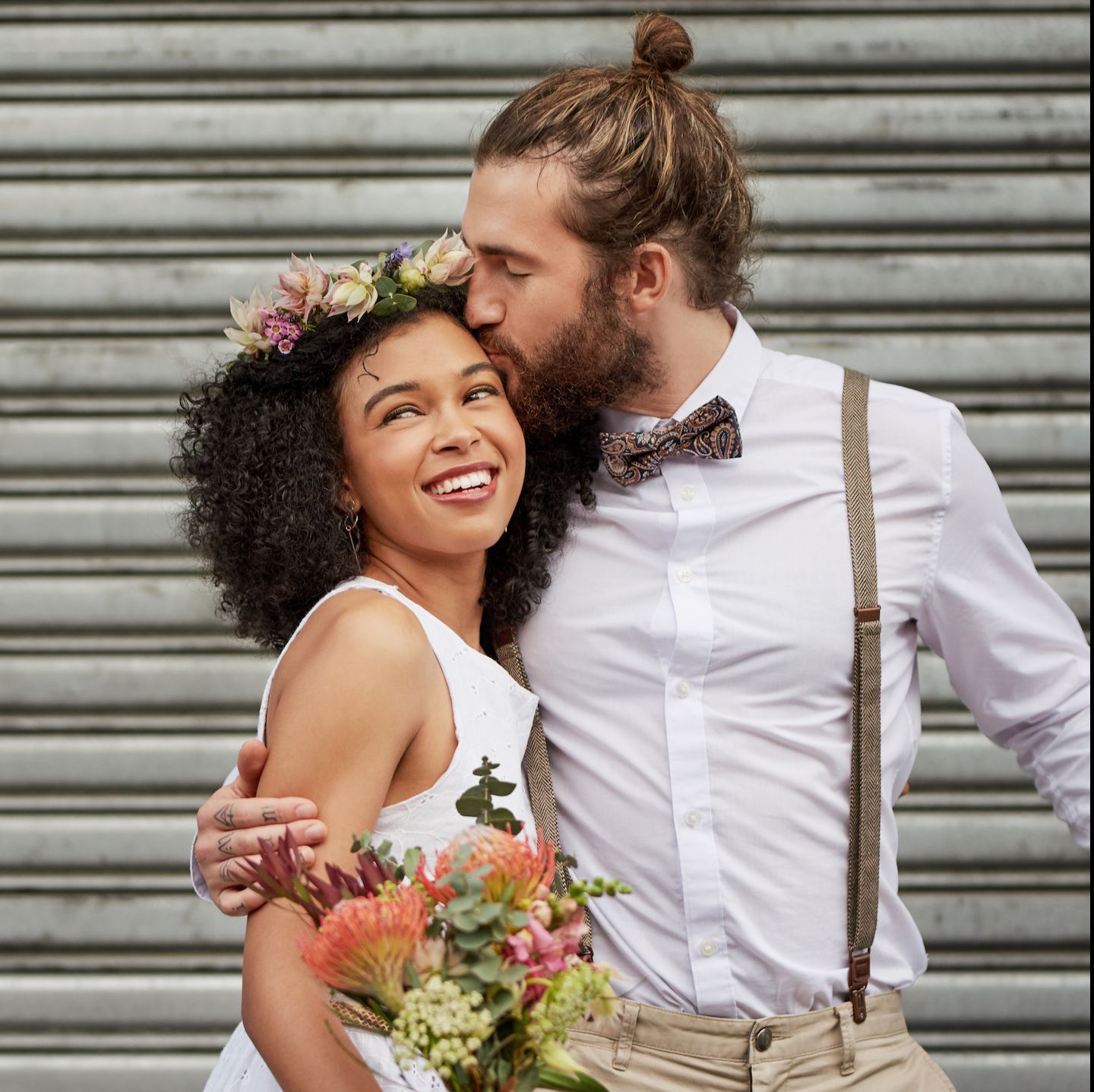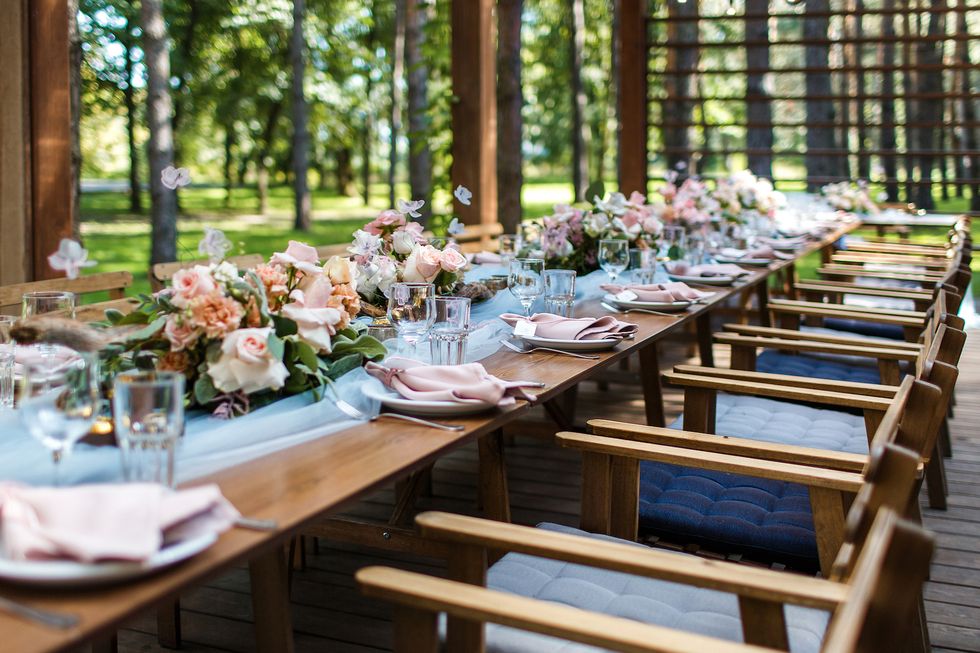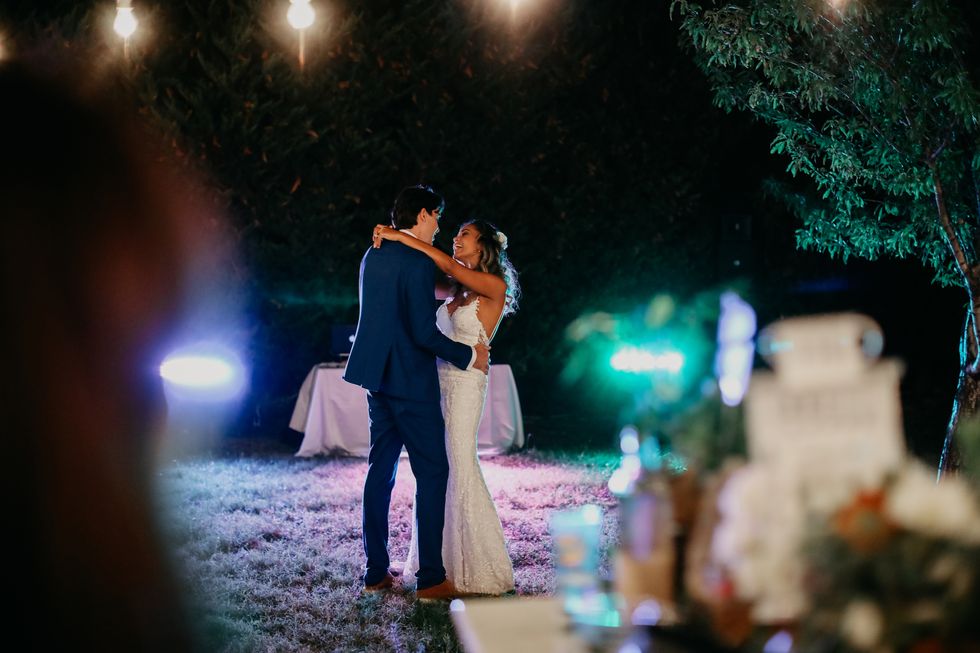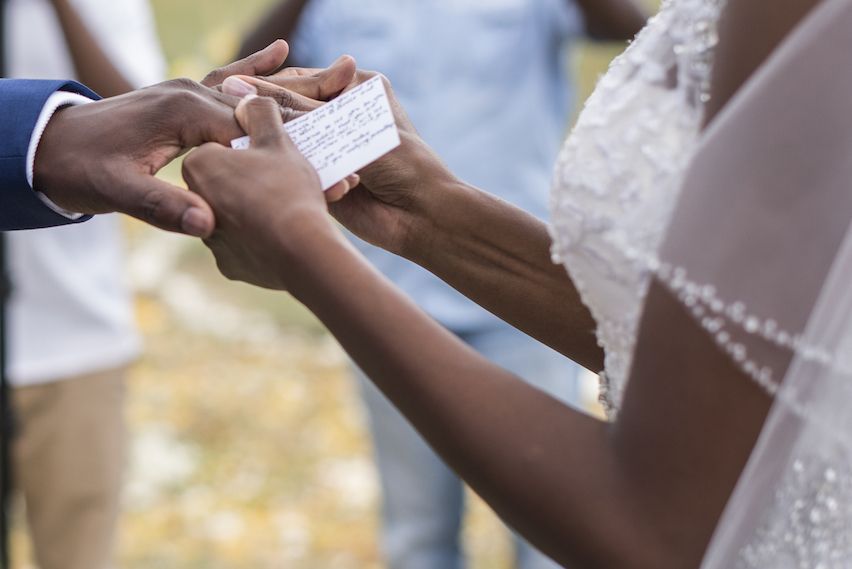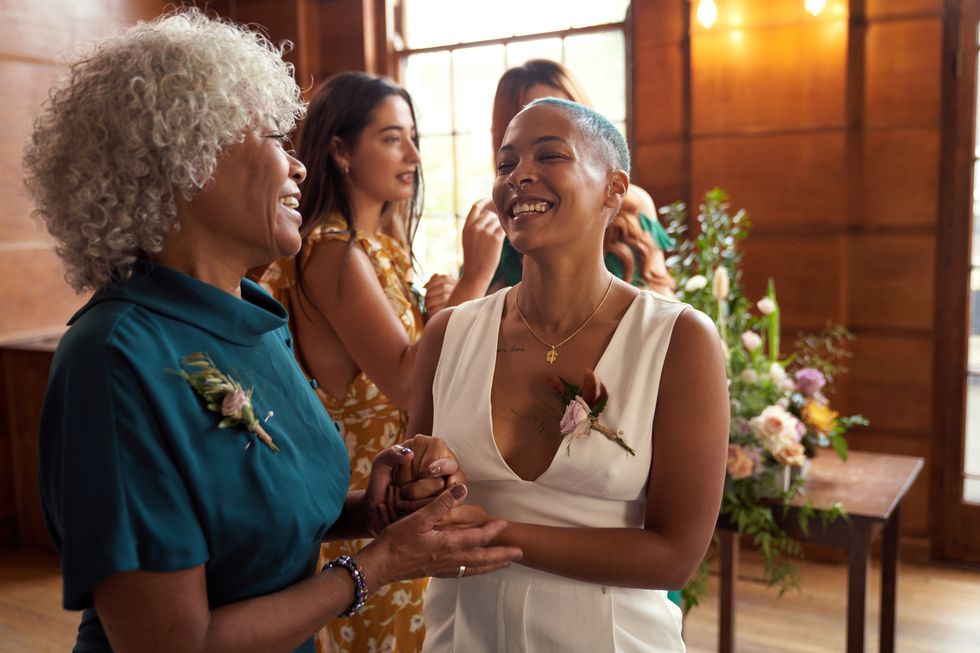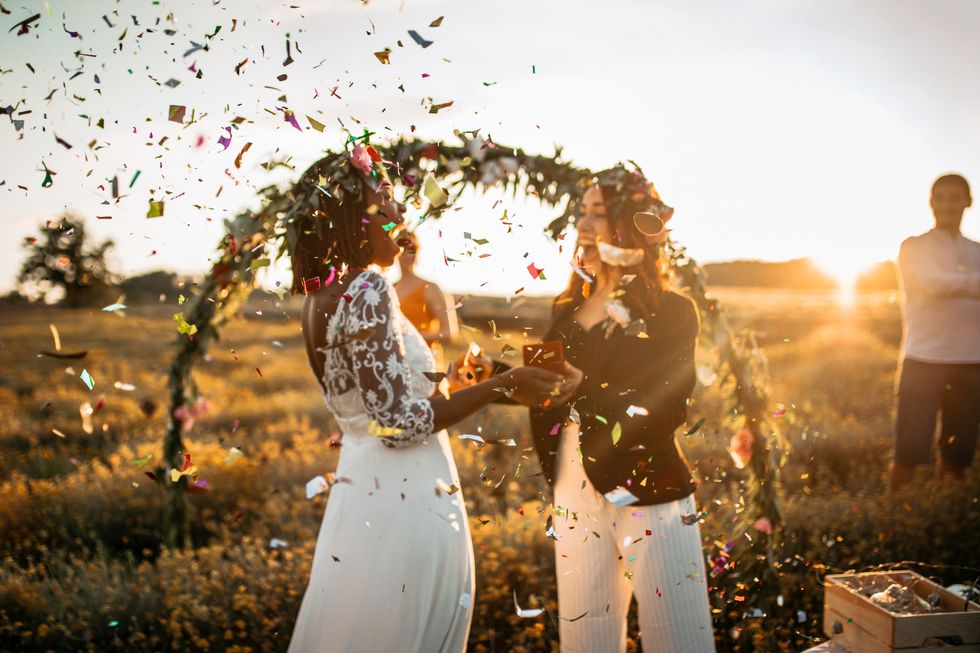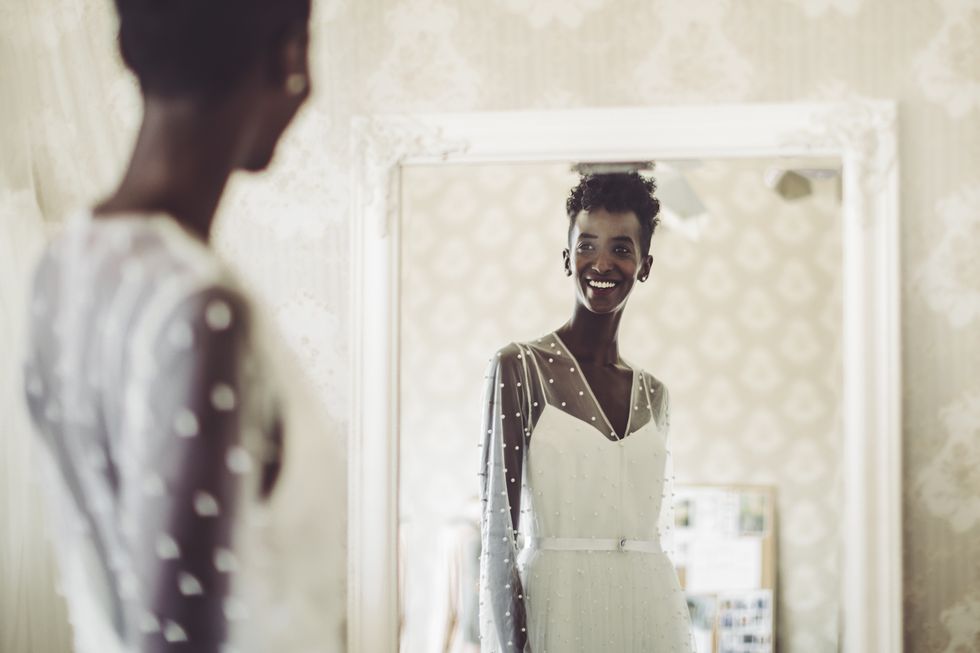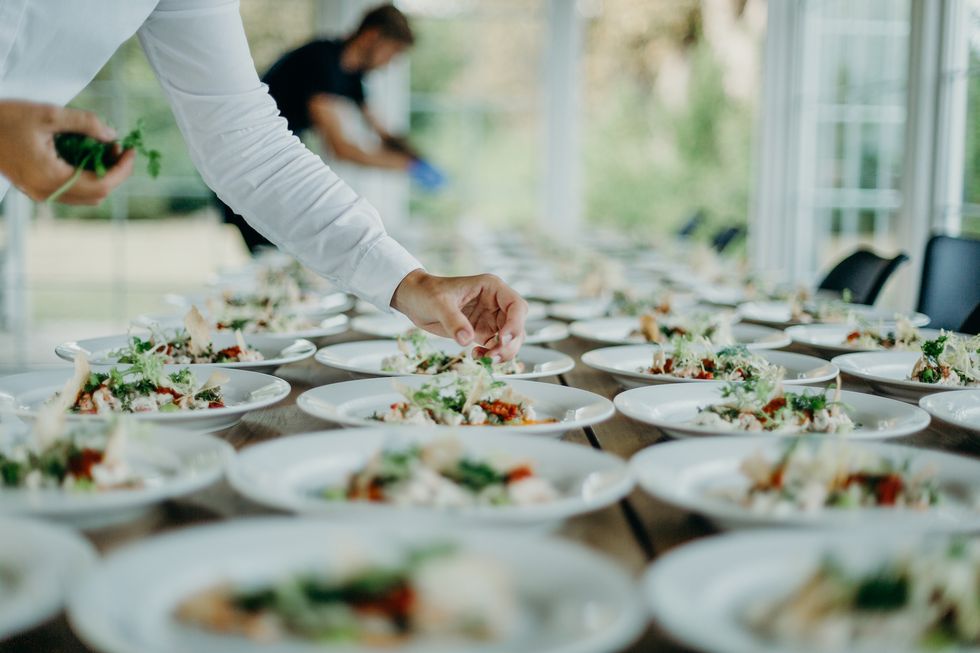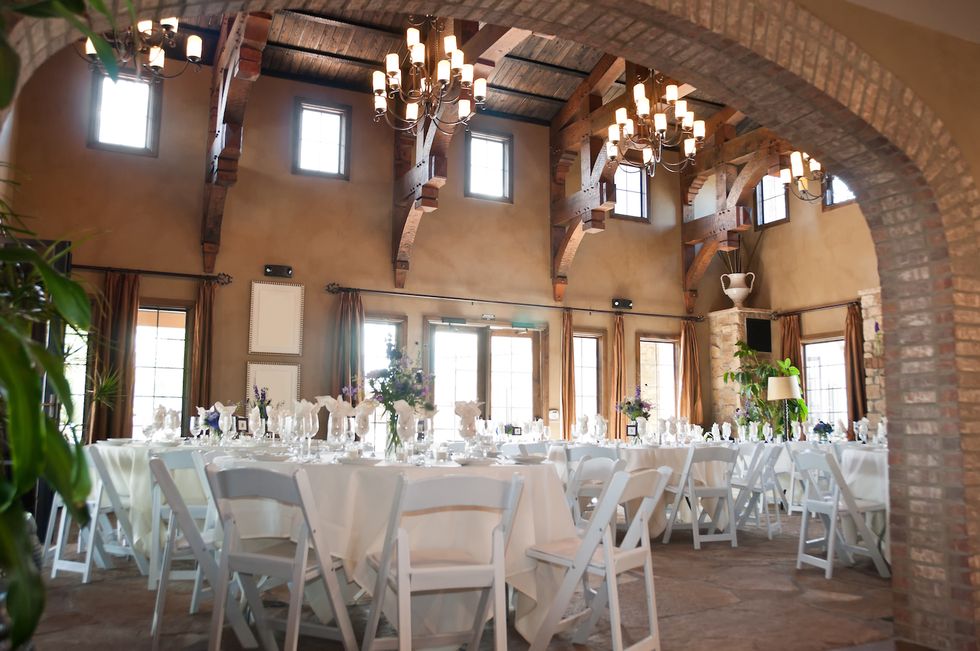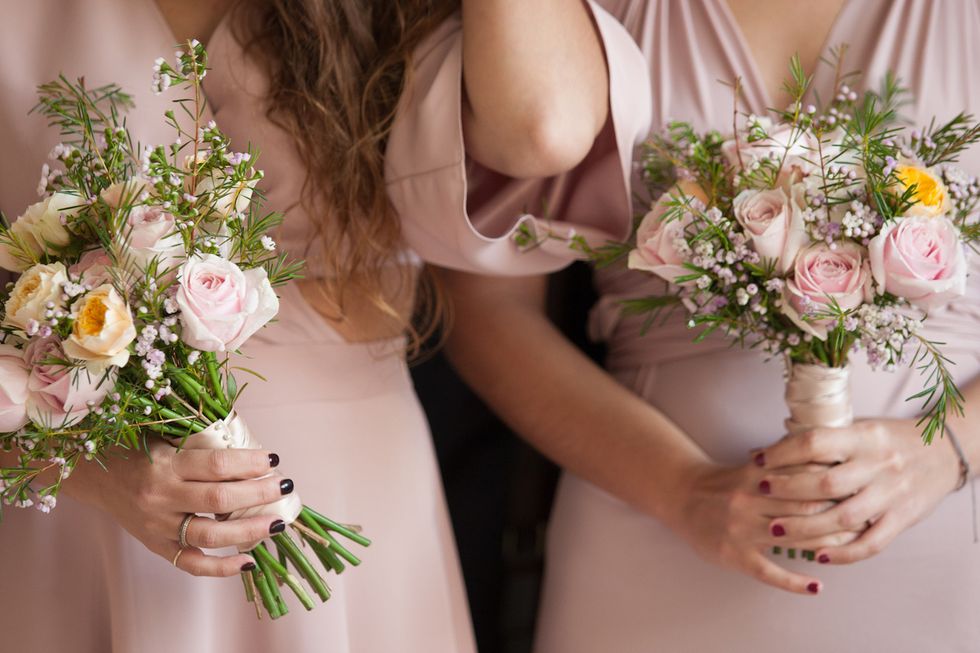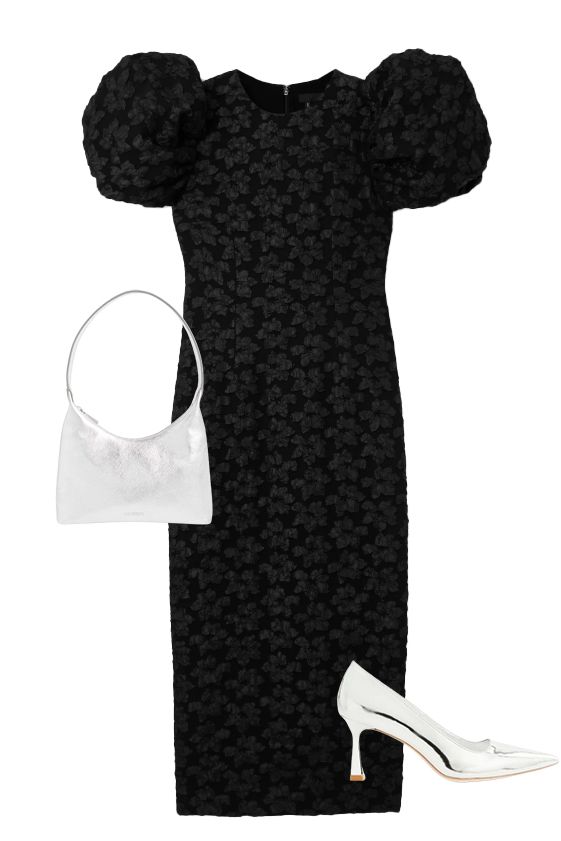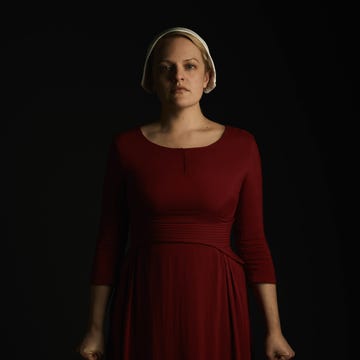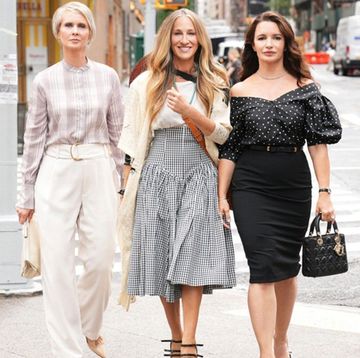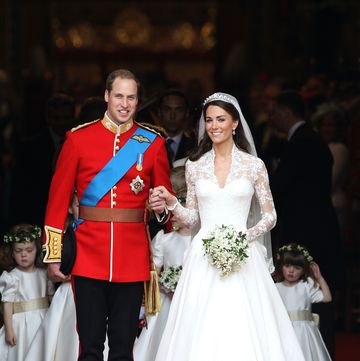We will be updating this piece as more information comes in.
The ongoing coronavirus pandemic has thrown into question several, if not all, aspects of daily life as we know it.
Naturally, the overall threat that the virus poses to the public’s health is of great concern, as is the future of small businesses, wages, rent and mortgage payments, food and resources and our ability to travel.
As a result of the virus, the wedding industry has been gravely hit. Couples across the world have been forced to postpone and even cancel their big days altogether (several times). Others are still left questioning whether their upcoming nuptials in 2021 will even be able to go ahead as planned, while photographers, planners, caterers and florists continue to find themselves without a steady stream of monthly income.
'It is horrid,' says celebrity favourite wedding planner Mark Niemierko of the current wedding climate. 'I am very aware of the heartbreak for couples that the fabulous day they had planned, the big celebration and hugging loved cannot take place. Likewise, for the industry - the relentless worry about finances, not being able to work, and with little or no government support for the endless freelancers and sole traders in our industry, for which there are many.'
Since the government outlined its first set of lockdown restrictions in March 2020, several couples have taken to social media to detail the latest news on their upcoming weddings, with some like Princess Beatrice and Edoardo Mapelli Mozzi cancelling their Buckingham Palace wedding reception, which was scheduled to take place in May last year, in lieu of a smaller, private affair in Windsor which occurred two months later.
After Chancellor Rishi Sunak unveiled a package of financial measures to help the UK economy during the pandemic last March, some wedding companies were able to provide leeway with clients when it came to fulfilling financial obligations, enabling them to postpone their nuptials to 2021 and 2022 and renegotiate contracts.
‘Like in most industries it’s a challenging time for us all,’ wedding photographer Oliver Holder told us at the beginning of the pandemic. ‘Fortunately, the wedding industry is one of the most buoyant, we just need to stick together and stay calm!’
On Monday February 22, Prime Minister Boris Johnson announced that a new lockdown roadmap would come into force which meant the gradual easing of restrictions would come in at the end of March. However, despite the majority of the UK believing that 'Freedom Day' after June 21 would signal the end of restrictions on weddings, it seems that's a reality we might have to wait a little longer for.
We spoke to several experts in the wedding and legal industry to find out practical advice for couples facing uncertainty with their upcoming weddings.
How many people can attend a wedding from June 21?
Under current lockdown restrictions that came into force on May 17, weddings and civil partnerships are able to go ahead with up to 30 people. You can read a summary of the spring lockdown plans here.
While many of us have been counting down the days until June 21, when it was expected that the UK would enter phase four of lockdown restrictions lifting and 'all legal limits on social contact' would be removed, a June 14 announcement revealed that day would be pushed back until July 19.
However, Johnson has made an exception for weddings, and we for one couldn't be more relieved.
According to the .Gov website, from June 21 the rules for wedding and civil partnership ceremonies, wedding receptions and celebrations will change.
It adds:
From June 21, there will no longer be a maximum number cap for attendees set out in law. Instead, the number of attendees at weddings, civil partnerships and receptions will be determined by how many people the venue or space can safely accommodate with social distancing measures in place. This will be based on the Covid-19 risk assessment of the venue or outdoor space, and the measures put in place to limit the spread of Covid-19.
A venue manager will be required to inform brides and grooms as to the maximum number of people who will be able to attend their nuptials.
For events taking place in locations such as gardens of a private home or on private land, 'organisers will need to make the space as safe as possible'.
'A marquee or other structure in a private garden must have at least 50% of its walled area open at any time for it to be classed as "outdoors" and for the limit based on safe capacity to apply,' the information reads.
'If you plan on having more than 30 people in your chosen venue or outdoor space, you must do this by completing a Covid-19 risk assessment to determine how many attendees will be able to attend, and following this guidance to make the event as safe as possible. Please see information below on what a risk assessment is and how to complete one.
'Some restrictions on ceremonies and receptions remain in place to enable them to take place safely. This includes Step 3 requirements on table service, face coverings, social distancing, and restrictions on dancing [except for the first dance] and singing.'
The previous Tier 5 national lockdown restrictions meant that weddings and civil partnership ceremonies could only take place with up to six people. Those working at the event were exempt from that limit.
'These should only take place in exceptional circumstances, for example, an urgent marriage where one of those getting married is seriously ill and not expected to recover, or is to undergo debilitating treatment or life-changing surgery,' it states of ceremonies. 'Weddings and civil partnerships must only take place in Covid-19 secure venues or in public outdoor spaces unless in exceptional circumstances.'
The news mirrored the four-week lockdown restrictions enforced by Prime Minister Boris Johnson on December 2, which was a far cry from the government guidance back in July which enabled ceremonies of up to 30 people to go ahead.
From July until September 2020, 30 people including the couple, photographer and witnesses were able to attend services, at a socially-acceptable distance. Singing was banned, in favour of recordings, 'because of the potential for increased risk of transmission from aerosol and droplets'. Hands were also to be washed before couples exchanged rings.
'Any pre-requisite washing/ablution rituals should not be done at the venue but carried out prior to arrival,' it added.
In addition, ceremonies were instructed to be kept ‘as short as reasonably possible’, no food and drink should be consumed (unless required for the purposes of solemnisation), speaking should not be in a raise voice and venues should be marked with floor tape to help people keep a social distance. Receptions were to be small, with only two households able to meet inside, and fathers weren't allowed to walk their daughters arm-in-arm down the aisle.
Johnson later stipulated a tightening of rules for weddings, restricting the number of guests from 30 to just 15 people, as Covid-19 numbers began to rise.
In a Commons statement on Tuesday September 22, the prime minister discussed the stricter rules for ceremonies in England, which were previously exempt from the ‘rule of six’ law introduced earlier in September. The new rules came into effect on Monday September 28.
In Northern Ireland, weddings of up to 10 people were allowed outdoors, while in Wales, they could take place as long as social distancing was enforced. Outdoor marriages and civil partnerships were also allowed to take place in Scotland.
How do you make a wedding special if you’ve had to change your plans completely?
According to recent data from wedding planning destination Hitched, 69% of couples who postponed their 2020 wedding plan to tie the knot between April and August this year, with around 40% of UK couples having been forced to downsize their 2020 wedding plan to hold another reception in the future.
However top wedding designer and planner Alice Wilkes urges brides and grooms not to see their upcoming wedding as a Plan B, rather a 'fresh start'.
'A micro wedding provides the perfect opportunity for a special and memorable day with your chosen ones,' she tells us. 'Look ahead to the idea of having a party to celebrate your nuptials later down the line.'
For those now planning to throw a small wedding this summer, Wilkes suggests elevating the design details not that they don't have to cater to 100+ guests. 'Add personalised place settings and get excited about your wedding again via bespoke design touches such as embroidered napkins, personalised place settings and illustrated menus. A smaller space allows much more freedom of design without the cost,' she notes.
When it comes to party favours, Wilkes believes the best are ones that 'truly represent the day and can be kept as a memory for your guests', whether it's baseball hats with guests nicknames on, hand calligraphed maracas, or bespoke fortune cookie with personalised notes inside. 'Why not also send these to your guests that were unable to make it due to the restrictions?' she says.
What does wedding insurance cover you for?
As is the case with most insurance you take out, be it for a car, property or holiday, insurance cover protects you from any unforeseen issues that might arise that could have financial implications.
When it comes to a couple’s big day, MoneySavingExpert.com explains that wedding insurance ‘covers a problem with the venue or a supplier, or a key wedding party member falling ill. It does not cover a change of heart’.
In most cases, depending on the type of cover a couple takes out, a wedding will be covered by insurance policies for the following:
- If a venue goes busts or cancels on you
- A supplier lets you down
- You’re forced to cancel because key guest can’t attend due to poor health
- Personal liability and legal expenses
- Lost, stolen or damaged goods
Will wedding insurance cover you for Covid-19?
It's still a grey area if an insurance policy will cover a wedding affected by Covid-19.
‘It will all depend what your wedding insurance specifically covers and the circumstances we’re now facing,’ explains Gary Rycroft, the chair of the Law Society’s digital assets working group and a consumer law expert.
In the early days of the pandemic, several companies including John Lewis Finance, Debenhams and Wedding Plan Insurance released statements on their websites informing customers that they were unable to accept any new applications for wedding insurance due to the outbreak.
‘We've suspended new Wedding Insurance policies in line with public health advice on coronavirus,’ reads a newly-updated statement at the time of publication on the John Lewis Finance website.
‘If you are an existing customer, we can assure you that your policy remains in place and unchanged.’
According to Rycroft, the government’s early advice to reduce social contact, previously listing locations such as pubs, clubs and theatres, was ‘not helpful wording from a legal point of view’.
The government initially told people to avoid these places, prior to instructing their closure, and have since instructed individuals to stay at home, where possible.
‘Be warned that insurance companies might use this vague nuance and argue that despite the government’s suggestions to avoid the aforementioned public spaces, weddings didn't come under its recommended places to avoid,' he says.
For any couple in doubt of their cover or their rights in the lead up to their wedding, the lawyer advises them to take legal advice about their specific circumstances such as contact the Citizen’s Advice Bureau here.
‘We need to look at every case in isolation,’ he assures couples. ‘Every case turns on its own facts.’
For anyone due to marry abroad or has a honeymoon booked in the coming months, they are advised to check the Foreign and Commonwealth Office website to find out further information.
Will you be covered if you decide to cancel a wedding?
When you make travel arrangements, if you want to cancel your flights or hotel and it’s your decision – not an external party’s – you will not be covered financially. Rycroft says the same measures will usually be applied to wedding plans.
‘If you decide to cancel a wedding, unless a country is banning entry, won’t supply visas or a venue has closed and you won’t be able to go ahead with the event, you will most likely not be covered by insurance,’ he states.
Wedding photographer Emma-Jane Lewis agrees, warning couples not to cancel nor postpone their weddings ‘too early if they can help it’, rather base their decision on government advice as it comes.
‘If a venue is still happy to go ahead but a couple are unsure, it can put couples in difficult situations and possibly incurring financial penalties,’ she says.
‘As a lot of photographers I am speaking with in the industry are trying to go ahead as normal like myself as best as we can while still going on government advice. Unfortunately, it is a very uncertain time, both for wedding couples who have invested months of planning and financial input as well as the wedding and events industry which are seeing restrictions imposed.
‘It means a lack of financial support from the government as freelancers, meaning we are feeling very isolated at this time without support.’
Does a postponement act as a cancelation?
For couples who are concerned that a wedding venue or supplier may view a postponement the same as a cancelation, Rycroft wants to reassure them that he believes they are two different things from a legal perspective.
‘When it comes to a situation like we now see ourselves in with Covid-19, we’re into the scope of contract law and considering what is reasonable,’ he explains. ‘For example, if you decide not to go ahead with a wedding because you get “cold feet”, it wouldn’t be uncommon for a couple to lose their wedding deposit. In addition, a venue/supplier might have an argument to demand more than the deposit, depending on how close the cancelation was to the date or charge the agreed amount in full.’
However, he says that if a couple gave a venue or supplier a reasonable amount of notice, ‘say six to nine months warning’ informing them that they want to postpone their big day, it should give the businesses plenty of time to ‘resell’ the date to another couple.
‘This all depends what is reasonable to request. We need to use established practices in cases concerning coronavirus,’ Rycroft adds.
Holder agrees, noting that if a couple needs to postpone their wedding and he is available on a new date ‘it wouldn’t be deemed a cancelation’.
‘The photography community is very strong and I am a member of a fantastic referral group who if in the unlikely event I was unable to cover a wedding day, a photographer of similar style and competence would photograph the day and they would be edited by myself,’ he adds.
From Jane’s perspective, she’s already looking at new, suitable dates with couples looking to postpone their wedding days at the moment but says it’s important to remain fair.
‘We understand that it is a stressful time for couples but try not to take it out on suppliers with harsh demands,’ she says. ‘There needs to be give and take on both sides and realistic expectations of the changes that can be made. Expecting a peak date on a Saturday in August, for example, as a swap with your current wedding date would be very unfair at this current climate. If neither the couple or the photographer can do any new proposed dates then it would come down to that individual photographer’s contract and what they would be willing to offer at such a late stage in the cancellation process.’
Niemierko advises brides and grooms hoping to marry in 2021 to rethink their plans. 'It is best to look at adapting your plans or patiently waiting to be rewarded with a wedding day like no other well into the spring of 2022,' he tells us.
What is a variation clause?
It is common in commercial contracts, such as those for weddings, to include a provision that any changes made to the contract are ineffective unless made in writing and signed by or on behalf of both parties.
This is known as a variation clause and is intended to prevent informal or inadvertent oral changes regarding situations such as contract cancelations or terminations.
Heather Stanford of contract template company Stanford Gould outlines on wedding website Love My Dress that sometimes contracts have clauses that deal with postponements.
‘Usually, there are financial consequences of changing or cancelling what you have originally agreed, and those consequences are usually more severe to the paying party the closer to the date they occur,’ Stanford states.
‘Given that most wedding suppliers get booked 12 – 18 months ahead of an event it is not unusual to see terms that require full payment, or substantial payment if you cancel within six months or less of the event.’
For a couple wanting to keep their booking with a venue or supplier but change the date of their wedding (note, a variation), Rycroft argues that this would still be there preferred option for both parties rather than a cancelation.
‘For venues and couples that are facing uncertainty, while rescheduling a wedding isn’t ideal, postponement is an attractive issue for both sides. From a business point of view, it shows the venue/supplier has viability because still want to trade with them,' he says.
When is the best time to contact suppliers if you're considering postponing your wedding?
In much the same way that if you were expecting an issue to arise with an upcoming event or travel plans, the best port of call when considering amending details to your wedding day is to contact suppliers and venues as early as possible.
Rycroft tells us that immediate action is required if you have concerns about your wedding day. ‘You won’t be the only one with concerns,’ he said. ‘As soon as you can articulate your worries and talk about options with your wedding venue, supplier and external contacts, the better. From a legal point of view, in many cases, the options on how to remedy the situation will narrow down if you leave it too late.’
As someone working in the wedding industry, Lewis advises couples to review their contracts with their photographers and speak to venues to see if they’re willing to go ahead with the wedding.
She warns couples to get in touch with suppliers ‘straight away to air their concerns and ask advice’.
‘Remember photographers will be dealing with a great deal of emails at this time, so please be patient and respectful and your photographer will be the same with you,’ she notes.
If you need to make a complaint to your insurance company, do so directly. If the company fails to respond or you are in disagreement with what they say, you can escalate your complaint to the free Financial Ombudsman. As an independent adjudicator, the ombudsman will make the final decision on a claim if you find yourself in a dispute with your insurer.
Do you have to have had a written agreement to amending wedding details?
If you’ve ever seen a legal drama on TV, you’ll know that a contract isn’t solely recognised as such when there’s a document with the word ‘contract’ in big bold letters printed at the top.
‘It’s perfectly possible to have a verbal contract, as long as it’s understood by all parties,’ explains Rycroft. He continues, explaining that they can also be in the form of emails, for example between a client and wedding supplier when ones asks a question and the other answers in agreement to something.
‘The key issue when considering wedding contracts is to take into account what are the terms of the contract, what did the parties understand them to be and how the contract was constructed (meaning what was intended),’ the lawyer explains. ‘The attraction of having a written contract is evidence of what’s agreed.'
Above all, keep a record of everything relating to your wedding so you can check over details if required.
If you have to postpone your wedding until 2022, how should you suggest this to a venue?
Many couples will have already gotten in touch with their wedding venues to enquire about changing the date of their big day, perhaps to one later in the year or next.
Now that we’re several months (almost a year!) into government lockdowns, most venues will already have protocols and postponement ‘in practice’ policies in place, according to luxury wedding planner Katrina Otter. As a result, if you have a wedding in the coming months, she says that now is the time to send an email to venue coordinators and ‘start an open and honest dialogue about any concerns that you have, postponement policies and potential fees’.
‘Also ask for a selection of dates that are available, should you need to postpone, so that you can run these past family members and your wedding party, followed by key suppliers (including your ceremony),’ she adds.
Niemierko says: ‘Ideally a venue should move your wedding to another date for no additional charge, however if they did incur costs, they should charge those without profit or mark-up. ‘
For example Niemierko is running a policy that so long as a wedding is moved within 12 months of the original date there are no additional charges.’
However, bear in mind that coordinators are dealing with extraordinary demands and an unprecedented number of enquiries. They might also be dealing with postponements from 2020 on a priority basis.
‘But so far I’ve found that venues are working incredibly hard to be as flexible, understanding and accommodating as possible,’ adds Otter, who has over 15 years experience in the wedding industry.
‘If you have to postpone then once you’ve agreed on a date with your venue, and as many suppliers as possible, ensure that you get this confirmed in writing, including any changes to payment amounts and / or terms,’ she continues.
Niemierko says that you must consider that if everyone in 2020 moved their wedding to 2021, it will mean a venue will make a loss. ‘Discuss options but be open to alternatives such as a winter wedding instead of summer nuptials, or a Friday ceremony in place of a typical weekend affair,’ he notes.
‘If you don’t yet think that’ll you’ll need to postpone but want peace of mind that you have a contingency in place, then still get in touch with your venue, ask the questions above and see whether it’s possible to put a plan b date on hold, just in case.’
What advice is there for couples wanting a date next year when they could be competing with double the amount of brides and grooms?
Otter says the best piece of advice she can offer is ‘to be as proactive as possible.
‘Get in touch (with your venue and key suppliers) and start that open and honest dialogue as soon as possible, whether that’s putting into action a full postponement plan or at least setting up a contingency plan for peace of mind and then staying in regular contact,’ she says.
‘Once you have options of various dates from the venue send a blind copy email to all your suppliers to see which dates work best with them, stress that you need to hear back from them as soon as possible. Then lock the new date in,’ Niemierko advises.
Should couples be willing to be more flexible or pay more money?
Many couples will know that the majority of wedding venues will already be fully booked for weekend dates this year and starting to do the same for 2022.
‘As a result, they don’t have the capacity or option to be able to offer key dates,’ explains Otter.
‘Even if venues have availability, they’re also businesses that need to protect themselves and continue operating so understandably many are offering no-fee postponements to weekdays or low-season dates only, with peak dates offered for an additional fee… the same also applies for some suppliers.’
‘If you have your heart set on a certain date and your venue can’t accommodate this (due to availability) or you don’t want to pay the additional fee then the very real reality is that you may have to compromise on your venue (and / or suppliers).’
From Niemierko’s experience, he says that as long as a couple postpone their wedding within a certain time frame, say six to 12 months, of the original planned date then suppliers and venues shouldn’t be charging additional fees.
However, given the financial impact on many small business in the wedding industry, he suggests considering ‘offering to pay the next instalment of your payment plan earlier if you can.
‘That simple generosity of breaking with the guide of an agreement or terms outline will be so greatly appreciated,’ he says.
If you paid for a Saturday in 2020 but are now having to go for a weekday in 2021, should you still pay the same amount?
Unfortunately, the answers is that this depends entirely on the venue.
While some might offer reduced rates for weekdays, others might charge the same amount for moth weekend and weekdays but without the no-fee postponement. Otter also says that some have increased their 2020 v 2021 rates to reflect increased costs, what’s now offered as part of the venue hire etc.), with postponement fees reflecting these changes.
That said, Niemierko adds: ‘There is no harm in discussing and asking your venue should you move your wedding to mid-week if that would save on your budget.’
If some guests are unable to attend your wedding, will you have to pay for them if it goes ahead?
Strictly speaking, if you’ve signed a contract saying you have for example 100 guests needing 100 meals on your wedding day then that is what you pay for.
However, given the circumstances, Rycroft says it’s important to chat to venues and suppliers to explain the difficulties as there might be scope to change the contract.
‘Contracts are set in stone in the sense that you whatever you sign up for, then that’s the deal,’ he says.
‘That said, you can go back before performance of the contract (when the wedding is scheduled to take place) to change details. Whether the other party will agree, depends on the bargaining power of the client. People’s bargaining power is shifting at the moment and there’s nothing to say that a contract can’t be changed if both parties are in agreement.’
Is it the client or vendor's responsibility to strike up a conversation about options during the outbreak?
While there is a duty for venues and suppliers to keep you updated with their changing practices, it’s important for the client to take action and raise any concerns about what might happen.
‘It comes both ways,’ says Rycroft. ‘People fall back and rely on legal documents and insurance during uncertain times like this. People are more reasonable if you have a conversation as soon as possible – we’re all human. We’re all facing uncertainty.’
Will you be financially covered if you paid for a wedding using a credit card?
Rycroft says that when considering what you’ve covered for financially when considering your wedding date, think about how you paid for certain things like venues and suppliers.
Consumer company Which? explains that under Section 75 of the Consumer Credit Act 1974, ‘a credit card company is jointly and severally liable for any breach of contract or misrepresentation by the retailer or trader’.
This currently stands for anything bought worth between £100.01 and £30,000 on a credit card.
This means that a credit card company is just as responsible as the retailer or trader for the goods or service supplied (in this case, for a wedding), allowing you to also put your claim to the credit card company.
‘If you paid for a venue on your credit card, they go out of business, the venue might not be able to pay, the credit card company should be able to cover you,’ says Rycroft.
According to Which? even if you’ve only paid a deposit and the rest was paid in cash, you're still covered for the whole cost of hiring the venue.
However, it’s important to remember that credit card protection isn’t a substitute for wedding insurance, for example in the cases when someone falls ill or personal liability.
What should couples do if they are worried about their weddings and losing money?
It is an uncertain time for people across the world during the Covid-19 outbreak.
However, when it comes to a wedding day, Rycroft advises couples to have an open conversation with wedding suppliers and venues.
‘They will also be having worries about whether people will go ahead – we’re all in the same boat – so it’s important to see if you can come to some agreement,’ he notes. ‘If you feel unhappy, for any reason, take legal advice. You can always talk with the venue/supplier and take legal counsel before replying and considering all your options.’

Katie O'Malley is the Site Director on ELLE UK. On a daily basis you’ll find Katie managing all digital workflow, editing site, video and newsletter content, liaising with commercial and sales teams on new partnerships and deals (eg Nike, Tiffany & Co., Cartier etc), implementing new digital strategies and compiling in-depth data traffic, SEO and ecomm reports. In addition to appearing on the radio and on TV, as well as interviewing everyone from Oprah Winfrey to Rishi Sunak PM, Katie enjoys writing about lifestyle, culture, wellness, fitness, fashion, and more.
